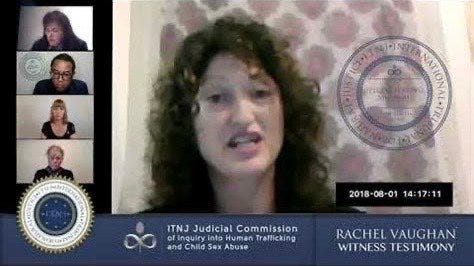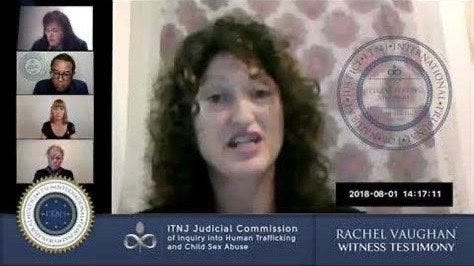TIP Movie Night: "Rachel Vaughan's Witness Testimony to ITNJ on Disappearance of Beaumont Children"
Overview, Key Insights, and Core Concepts
TIP Movie Night: “Rachel Vaughan’s Witness Testimony to INTJ on Disappearance of Beaumont Children”
Overview:
Introduction:
Rachel Vaughan’s testimony highlights the 1966 “Disappearance of the Beaumont Children” case in South Australia, unresolved after half a century. It also raises serious concerns regarding the Mullighan Report, (a 600-page Royal Commission report of sex abuse against Australia’s children in state care over four decades) where the names of perpetrators were suppressed, and the truth locked away by the South Australian government for 80 years. Rachel has put her life on the line to expose multiple murders and mutilations perpetrated by her father, who's organized pedo-criminal ring is allegedly still in operation today. Her testimony was heard via a virtual sitting of the ITNJ’s Judicial Commission of Inquiry into Human Trafficking & Child Sex Abuse on 1st August, 2018.
Summary:
In a deeply harrowing testimony, Rachel Vaughan shared her experiences as a victim of systematic abuse and violence during her childhood in South Australia. Born in 1973, she described her treatments at the hands of an organized group of pedophiles that included physical, sexual, emotional, and spiritually abusive practices tied to satanic rituals. Throughout her ordeal, she witnessed appalling crimes, including the murders of six children, and named her father, Alan Maxwell McIntyre, as a key perpetrator involved in child abductions and murders, including the notorious Beaumont children case.
Rachel recounted being forced to partake in witnessing, and at times, the act of dismemberment and disposal of bodies under her father's orders. She revealed her half-siblings, Andrew McIntyre and Ruth Collins, both corroborate her accounts and have their own histories of abuse. They, too, have made allegations against their father regarding heinous acts and abuse within their family structure. Despite exposing these horrifying events, Rachel emphasized the lack of action from police and authorities, pointing out systematic failings where her father's notoriety as a person of interest failed to lead to proper investigations or prosecutions.
Rachel also discussed the broader culture of child abuse stemming from a network of powerful figures, including police, who conspired to keep these crimes shrouded in silence. The discussion extended to the Mullighan Inquiry, which cited extensive evidence of child abuse within state institutions, and highlighted the emotional and psychological scars left on survivors, such as herself. Her motivation for coming forward is rooted in a desire for justice, accountability, and a hope to protect vulnerable children from similar fates, revealing that her family remains entangled in a legacy of abuse and cover-ups in South Australia.
Key Insights:
Survivor Testimony and Courage:
Rachel Vaughan’s story underscores the incredible courage required to speak out against systemic abuse. Her detailed testimony serves to empower other survivors, showing that it is possible to challenge deeply ingrained silence and confront past horrors. The act of public testimony is not just an act of personal catharsis but a powerful mechanism for social change and can ignite conversations around safeguarding against child exploitation.
The Role of Systemic Barriers:
Rachel's testimony reveals how systemic failures in law enforcement create an environment where abuse can thrive. Her experiences highlight the importance of a thorough investigation by authorities to ensure crimes against children are root out rather than buried. There exists a culture of disbelief within police that undermines the truth and perpetuates a cycle of abuse, showcasing a dire need for reform in protective services and law enforcement.
Corroboration Among Survivors:
Collaborative efforts among survivors like Rachel, Andrew, and Ruth demonstrate the importance of shared experiences in validating claims of abuse. The strength found in unity promotes a collective voice that can pierce through the silence that individual victims often face. This synergy not only enhances the truth of their narrative but also reinforces the urgent necessity for thorough investigations into child abuse cases.
Institutional Complicity and Cover-ups:
Rachel's account points to alarming allegations of complicity across various social institutions, from the police to other governing bodies, that fail to act on reports of abuse. This reflects a broader culture of silence where powerful individuals manipulate the system to protect themselves at the expense of vulnerable children. It emphasizes the critical importance of transparency and accountability in organizations that are meant to protect communities.
The Depth of Psychological Trauma:
Rachel’s enduring trauma and symptoms of anxiety and depression serve as a testament to the long-lasting effects of childhood trauma. It is not enough to simply recognize the plight of survivors; there must be adequate support systems in place to help them heal. Awareness and understanding of the transformative impact of childhood violence on mental health are essential for comprehensive recovery programs.
Courageous Parenting:
Rachel’s resolve to protect her children from potential predators reveals a new generation of responsive parenting that challenges historical norms. Overcoming the trauma she faced to become an activist and advocate against child exploitation speaks volumes about the resilience of survivors. Her fight embodies the hope that through awareness and testimony, future generations can be safeguarded from suffering similar fates.
Calls for Legislative Reform:
The injustices Rachel faced, including her father's immunity and a lack of investigation into credible allegations, highlight significant gaps in the legal framework governing child protection. Her testimony strengthens the argument for legislative reform to enable better protection for children and ensure that survivors of abuse are heard and believed. Advocating for safer laws is imperative for dismantling patterns of silence and abuse in society.
Core Concepts:
The Thirteenth Witness:
Rachel's testimony is not merely a recount of her personal experiences; it is a harrowing call to action for society to recognize and combat the pervasive culture of child abuse. By sharing her unique insights and experiences, she stands as a living testament to survival, accountability, and the necessity for a proactive approach to protecting children.
Witness and Victim Cooperation:
The combined narratives of survivors provide a greater context of the victimization within familial structures and social circles steeped in abuse. This shared knowledge and collaborative account strengthen their claims, adding urgency to the necessity for authorities, communities, and advocates to listen, believe, and take action.
Psychological Resilience and Community:
The narrative showcases the psychological resilience of survivors who channel their trauma into advocacy, which is crucial for both personal healing and societal change. Survivor-led movements draw attention to these issues, fostering a community of shared strength and interconnected support systems that empower individuals to come forward.
Truth and Belief:
Central to Rachel's narrative is the existential battle for truth in a world entrenched in disbelief and skepticism toward victims. Engaging with their truths can prevent further abuse and dismantle the archaic stigma surrounding victimization, encouraging a shift toward profound empathy and understanding.
The Interconnectedness of Systems:
The testimony throws light on how various systems interconnect, from familial structures, community support, to state and federal law enforcement agencies; they must work in harmony to protect children. Each entity has a crucial role to play in breaking the cycles of abuse.
Legacy of Silence:
The need to confront a violent past and heal is a recurring theme, culminating in the acknowledgment that silence perpetuates harm. Rachel’s narrative implores society to break this silence, protect the most vulnerable, and advocate for those who have fallen victim to horrendous crimes.
Empowerment Through Knowledge:
Education and awareness serve as vital tools in preventing child abuse. Rachel’s story serves as a living human resource, urging communities to leverage their own understandings of trauma and resilience to foster robust protective measures for children.
For More Rachel Vaughan:
Previous Episodes on ‘The Imagination’ Podcast:
S4E10 | Rachel Vaughan: Surviving a Serial Killer Father & MK ULTRA, & Beaumont Child Murder Mystery: https://rumble.com/v3swm1e-s4e10-rachel-vaughan-surviving-a-serial-killer-father-and-mk-ultra-and-beau.html
S4E31 | “Psychic Abilities & Spiritual Gifts Panel” Feat. Rachel Vaughan, Max Lowen & Doug McIntyre: https://rumble.com/v46n84b-s4e31-psychic-abilities-and-spiritual-gifts-panel-feat.-rachel-vaughan-max-.html
S4E44 | “Rachel Vaughan - The '6th Science' of MK ULTRA & Psychic Abilities, Ley Lines & Auras”: https://rumble.com/v4dulsx-s4e44-rachel-vaughan-the-6th-science-of-mk-ultra-and-psychic-abilities-ley-.html
S5E61 | Rachel Vaughan - Australia’s ‘Beaumont Children Abduction & Murder Mystery’ Case SOLVED: https://rumble.com/v6rq8pz-s5e61-rachel-vaughan-australias-beaumont-children-abduction-and-murder-myst.html
Connect with Rachel Vaughan:
Websites: www.6thscience.com, www.leylovedown.com, & https://elink.io/p/rachelvaughan-9b0a547
LinkedIn: https://www.linkedin.com/in/rachel-vaughan-137174160/
Twitter / X: https://twitter.com/weazel8888
Facebook: https://www.facebook.com/rachel.06012015/
Instagram: https://www.instagram.com/srawhistleblowerrachelvaughan/
Telegram: https://t.me/RachelVaughan
TIP Movie Night: “Rachel Vaughan’s Witness Testimony to INTJ on Disappearance of Beaumont Children”





